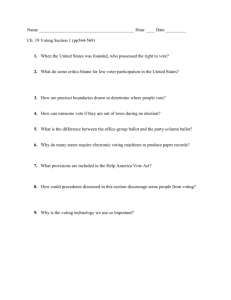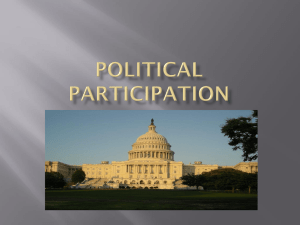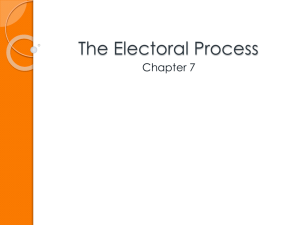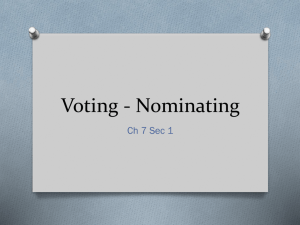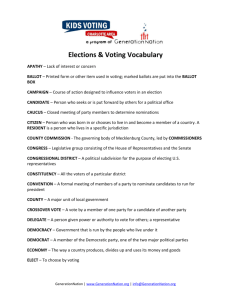Participation, Voting, Campaigns, Elections (oh my)
advertisement
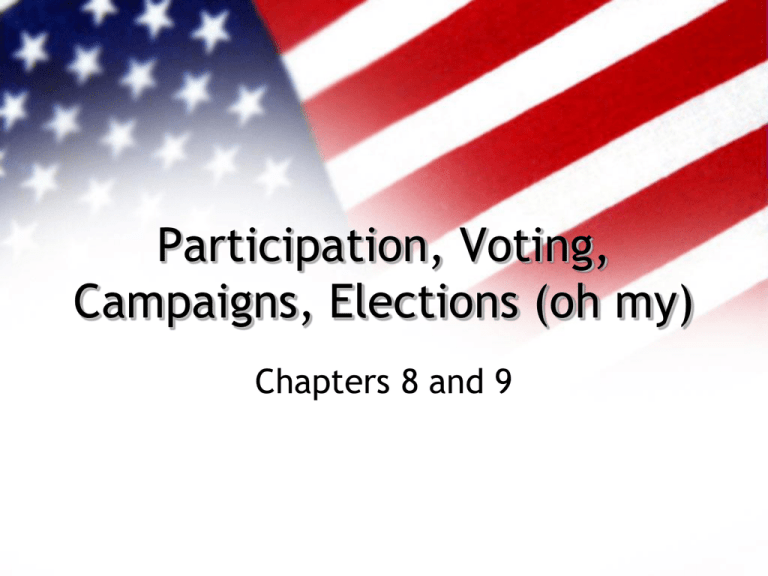
Participation, Voting, Campaigns, Elections (oh my) Chapters 8 and 9 Political Participation • Political Participation - Involvement in activities intended to influence public policy and leadership, such as voting, joining political groups, writing to elected officials, demonstrating for political causes and giving money to political candidates Political Participation • Voter Turnout - “The proportion of persons of voting age who actually vote in a given election” - Average voter turnout for a Presidential election since 1960 = 55% - Midterm election voter turnout has seldom topped 40% since the 1970s - In many places local election turnout is barely 20%. Why people don’t vote • Registration - “The practice of placing citizens’ names on an official list of voters before they are eligible to exercise their right to vote. “ - Originated as a practice to stop people from voting multiple times, but now puts a hardship on honest people. - In the United States, it is the responsibility of the person to register. In many European countries, registration is automatic. Political Scientists estimate voter turnout would increase by 10% with automatic registration. Why people don’t vote • Election frequency – America has more elections and has them more often than any other country. This multitude of elections makes it less likely voters will participate in all of them. – Further, many European countries hold elections on Sundays or national holidays. Since the USA mostly holds elections on Tuesdays, it is more difficult for people who work to participate. Why people don’t vote • Party Differences – With only two major political parties, it is less likely a voter will find one to truly identify with. – Since the party has to get 50% of the vote, both parties will often take moderate stances on issues, meaning it sounds like they both stand for the same times. – In elections where there are clear divides between the parties (such as the 2008 Presidential election) voter turnout tends to be higher. Political Participation • Some people almost always vote due to a sense of civic duty • Civic Duty - The belief of an individual that civic and political participation is a responsibility of citizenship. Political Participation • Some voters, however, rarely vote due to apathy or alienation • Apathy - A feeling of personal disinterest in politics or unconcern with politics - “I don’t care either way” • Alienation - A feeling of personal powerlessness that includes the notion that government does not care about the opinions of people like oneself -- “My vote doesn’t matter anyways” Voting • Age – Older voters are more likely to vote – Older voters often live in the same place one election to the next and thus don’t need to re-register – Older voters often have children or own homes, and feel they have more to lose by not voting – However, participation by young Americans is rising (especially in 2004 and 2008) Voting • Education and Income – People with a college degree or those in a high income bracket are twice as likely to vote as someone who did not finish high school or that is in a lower income bracket. – Americans in lower income brackets are more harshly affected by the registration system. – There is no political party that exclusively targets lower income voters. Other means to participate • Campaign and lobby activities – Americans are more likely than European countries to take part in campaigning due to the large numbers of local offices – Americans are also more likely to write their representatives and ask for change – Americans are also more likely to donate to influential lobby groups. Other means to participate • Virtual Participation – Virtual participation far outweighs conventional participation – Large numbers of Americans use the internet to promote their favorite candidate – President Obama was the most successful in raising funds in 2008, largely due to the sum of all the small donations he received online. Other means to participate • Community Activities – Millions of Americans are members of community organizations (parent teacher groups, neighborhood groups, business clubs, church groups etc) which often influence local politics – The number is declining though, along with the social capital of America Other means to participate • Social Capital - The sum of the face-to-face interactions among citizens in a society. ELECTIONS! • Primary Election – Election in which voters choose the candidate that will represent their political party in the general election. Elections • Open Primary – Election in which a voter can participate in either party’s primary regardless of party registration. – Missouri usually uses an Open Primary • Closed Primary – Election in which only registered members of a party can participate in the primary. • Caucus – A small meeting at which registered political party members select delegates to attend the national party convention and nominate a Presidential candidate. – Since Missouri is an “open” state, you do not have to be registered. • Front Loading – The practice of moving presidential primary elections to the early part of the campaign, to maximize the impact of these primaries on the nomination. • To combat front-loading both parties are taking a stand against states that hold their primaries early. • For 2012 the Republicans threatened to cut the amount of delegates a state get to have attend the national convention in half if a primary is held before March 6th • Because of this backlash, Missouri will be using the caucus system to select delegates to the National Convention. The Missouri Caucus • Mar 17th 10am – Each county will have a caucus and select delegates to attend the district caucus • April 21st – Each district will hold a caucus to determine who gets to attend the State Convention • June 1-3 – The State Convention will caucus to determine who gets to attend the National Convention. How people vote • Issue Voting – Voting style in which the voter judges candidates based on the voter’s and the candidates’ opinions on specific issues and preferences for certain policies. How people vote • Prospective Voting – Voting style in which voters judge a candidate based on their assessment of what the candidate WILL DO if elected. • Retrospective Voting – Voting style in which voters judge candidates based on PAST performance. Voting • Australian Ballot – An official government-produced ballot for elections that lists all offices and all the candidates and parties that have qualified to be on the ballot. Voting • Office-Block Ballot - A form of general election ballot in which candidates for elective office are grouped together under the title of each office. (used in Missouri) • Party-Column Ballot - A form of general election ballot in which all of a party’s candidates for elective office are arranged in one column under the party’s label and symbol CAMPAIGNS!!! • Focus Groups – In-depth interview with a small number of people representing important voter consistencies. Campaigns • Battleground States – Competitive states in which no canddate has an overwhelming advantage • Red States – State in which a Republican is likely to win • Blue States – State in which a Democrat is likely to win. Here comes the money! • Hard Money – Funds to be used by candidates or parties for the express purpose of running an election campaign. • Soft Money – Funds to be used for political purposes other than running a campaign More Money • Political Action Committee (PAC) – Group that collects money from individuals and makes donations to political parties and candidates. – Typically the election donation arm of an interest group.
